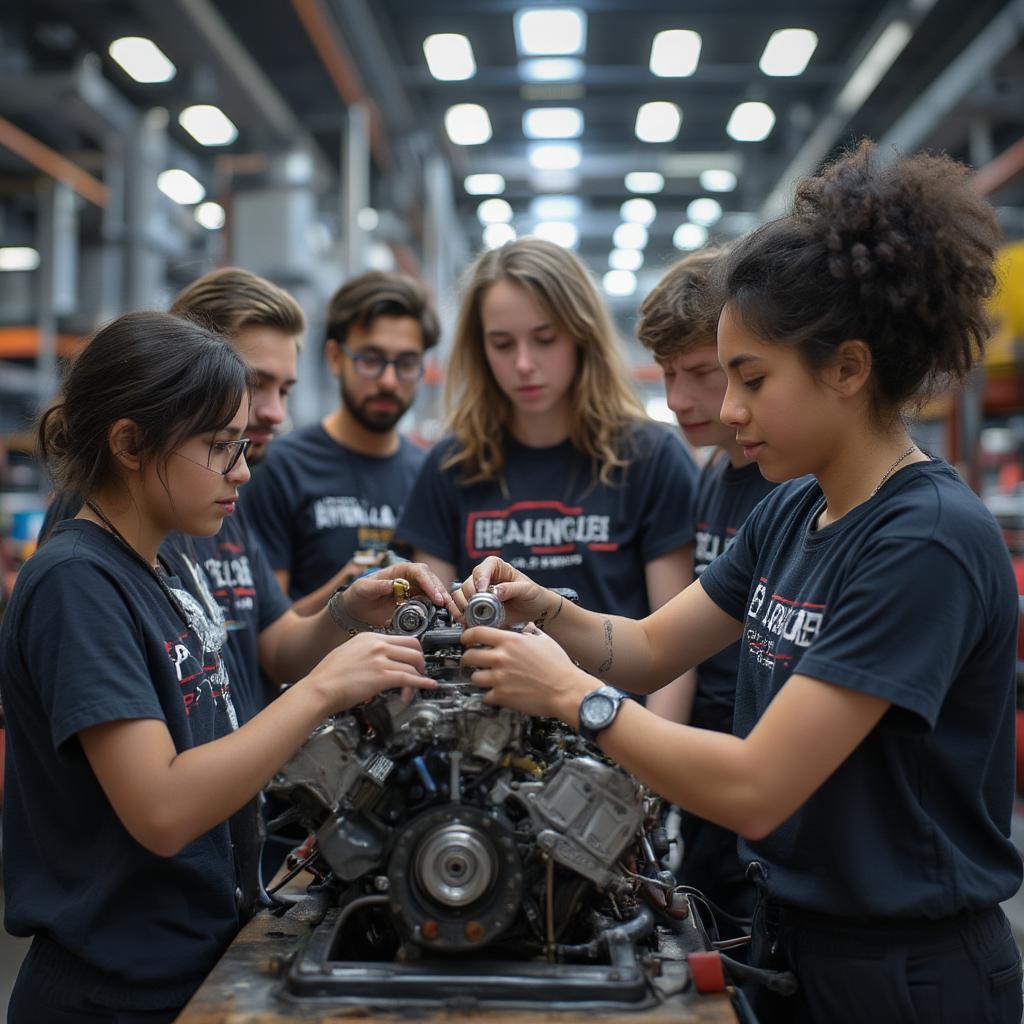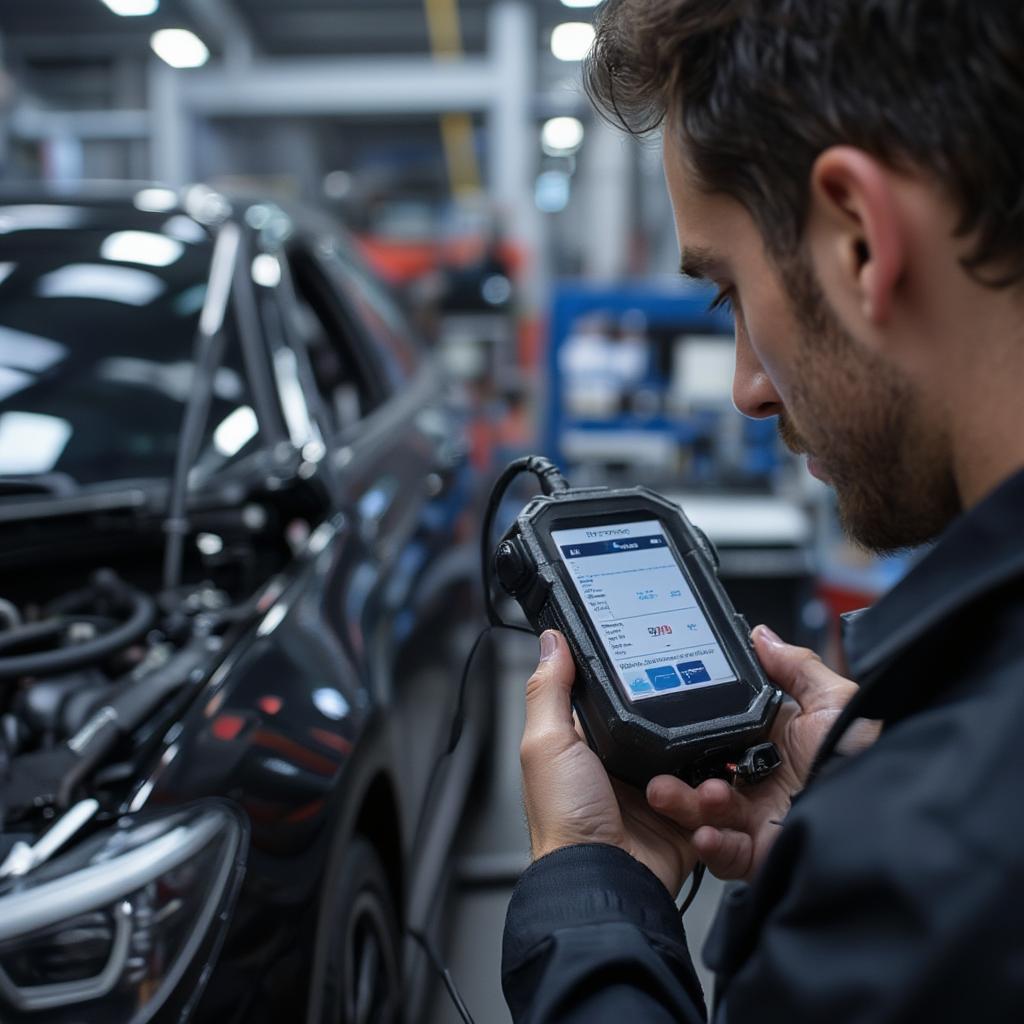Auto Body Repair Technician Training: Your Path to a Successful Career

The automotive industry is constantly evolving, demanding skilled professionals who can keep pace with technological advancements. Auto Body Repair Technician Training is a crucial step for anyone looking to embark on a rewarding career in this field. This comprehensive guide will explore the various facets of this training, from the types of programs available to the career paths you can pursue. Whether you’re a recent graduate or someone considering a career change, understanding the nuances of auto body repair technician training will set you up for success. Let’s delve into what it takes to become a top-notch auto body repair technician.
Understanding the Landscape of Auto Body Repair Technician Training
Auto body repair isn’t just about banging out dents. It’s a complex field that requires a blend of technical skills, problem-solving abilities, and a keen eye for detail. Auto body repair technician training programs are designed to equip you with the necessary knowledge and skills to excel in this demanding profession. The training typically encompasses several areas, including:
- Structural Repair: Learning to identify and repair damage to the vehicle’s frame and chassis using welding techniques, panel replacement, and frame straightening equipment.
- Panel Repair and Replacement: Mastering the art of reshaping damaged panels using specialized tools and techniques. Also involves installing new panels, ensuring proper alignment, and finish.
- Refinishing: Developing skills in surface preparation, paint application, color matching, and achieving a flawless finish. This includes understanding different paint types and application methods.
- Vehicle Systems: Gaining knowledge of basic vehicle mechanics, including electrical and mechanical systems, to better understand how damage might affect a car’s overall function.
- Estimating: Learning to assess damage, create repair estimates, and work effectively with insurance companies.
Types of Auto Body Repair Technician Training Programs
When you’re looking for auto body repair technician training, you’ll find various educational paths, each tailored to different needs and career aspirations. Here are some common options:
- Vocational Schools: These schools offer hands-on, intensive programs focusing on specific job skills and practical applications. The training is typically shorter and designed to get you job-ready quickly.
- Community Colleges: Many community colleges provide associate degree programs that combine classroom learning with practical shop work. These programs offer a broader base of knowledge, preparing you for various career paths. You might even consider a mechanic associates degree for a more comprehensive understanding of automotive systems.
- Apprenticeships: An apprenticeship program offers on-the-job training under the guidance of an experienced technician. It combines practical experience with classroom instruction and is often offered in partnership with employers. This allows you to earn a wage while you learn.
- Manufacturer-Specific Programs: Some automotive manufacturers offer specialized training programs focused on their specific models and technologies, which can be advantageous if you plan to work on certain brands.
“The key to becoming a successful auto body technician is continuous learning. The technology is constantly changing, and staying up-to-date with the latest repair methods is crucial.” – Dr. Alistair Finch, Automotive Technology Education Specialist

Core Skills Covered in Auto Body Repair Training
Regardless of the specific program, your auto body repair technician training will cover certain essential skills. These core competencies form the foundation of your expertise and include:
- Welding: Mastering various welding techniques (MIG, TIG) is essential for structural repairs and panel work.
- Metal Fabrication: Understanding metal properties and how to cut, bend, and shape it to create or repair auto body parts.
- Painting: This involves learning different paint types, mixing techniques, and applying paint with spray guns to achieve a factory-like finish.
- Damage Analysis: Learning how to assess damage accurately, identify underlying issues, and create an effective repair plan.
- Safety Procedures: Adhering to safety protocols is critical, as auto body repair involves working with heavy equipment and potentially hazardous materials.
- Use of Advanced Repair Techniques: Training on the use of advanced techniques such as plastic welding and use of specific compounds.
If you are interested in the electrical side of vehicles consider looking at auto electrical courses near me for even more opportunities to expand your knowledge base.
What to Expect During Your Training
The structure of your auto body repair technician training will depend on the type of program you choose, but here’s what you can typically expect:
- Classroom Instruction: This phase covers the theory behind auto body repair, including material science, vehicle construction, and repair techniques.
- Shop Work: Hands-on practice in a simulated shop environment, applying classroom lessons to real repair scenarios.
- Equipment Training: Learning how to operate specialized tools and equipment such as welders, paint spray guns, frame straighteners, and diagnostic tools.
- Project Work: Completing specific repair projects to demonstrate your skills and understanding.
- Assessments: Written and practical exams to evaluate your knowledge and proficiency.
Why Choose a Career as an Auto Body Repair Technician?
Becoming an auto body repair technician can be a financially rewarding and fulfilling career path. Here’s why it’s a great choice:
- High Demand: The demand for skilled auto body technicians is consistently high, ensuring job security and opportunities for advancement.
- Competitive Salaries: Experienced technicians can earn good salaries, with the potential to increase earnings through performance and specializations.
- Hands-on Work: If you enjoy working with your hands and solving problems, this career provides a perfect blend of technical work and creative problem-solving.
- Satisfaction: Seeing a damaged vehicle restored to its original condition is a rewarding feeling. It’s satisfying to see the result of your hard work.
- Variety: You’ll encounter various vehicle types, and each repair is unique, keeping the job interesting and challenging.
“The automotive repair field is constantly evolving with new technologies. This requires auto body technicians to embrace continuous learning and adapt to changes quickly.” – Josephine Dubois, Master Automotive Technician
Career Paths After Auto Body Repair Technician Training
After completing your auto body repair technician training, you’ll have numerous career paths to choose from. Here are some possibilities:
- Auto Body Technician: The most common role, involving hands-on repairs of damaged vehicles.
- Refinishing Specialist: Focusing specifically on the painting and refinishing aspects of auto body repair.
- Estimator: Assessing damage and writing repair estimates for insurance companies and customers.
- Shop Manager: Overseeing the operations of an auto body repair shop and managing a team of technicians.
- Insurance Adjuster: Working for insurance companies to assess damage and manage claims.
- Specialized Repair Technician: Focusing on specific types of repairs, such as plastic welding, aluminum repair, or collision repair systems. You may find information on auto collision estimating courses valuable if you choose the estimator path.
How to Choose the Right Auto Body Repair Technician Training Program
Selecting the right training program is crucial for your success. Consider the following factors:
- Accreditation: Ensure the program is accredited and recognized by industry organizations.
- Curriculum: Review the course curriculum to ensure it covers the necessary skills and techniques.
- Hands-on Experience: Opt for a program that provides ample hands-on training and real-world projects.
- Instructors: Look for programs with experienced instructors who are industry professionals.
- Equipment: The program should have modern tools and equipment to provide you with relevant training.
- Location & Schedule: Consider the location and schedule of the program to ensure it fits your lifestyle.
- Cost: Compare the overall costs of the programs, including tuition, materials, and any other fees.
- Job Placement: Inquire about job placement assistance and career services offered by the school.
If you’re looking for a well-rounded background before specializing in collision repair, a cert ii in automotive might be a great place to begin.
The Impact of Technology on Auto Body Repair Training
Technology is rapidly transforming the automotive industry, and auto body repair technician training programs must adapt to these changes. New technologies like advanced driver-assistance systems (ADAS), electric vehicles (EVs), and composite materials require technicians to stay updated on the latest repair techniques. Training programs now include:
- ADAS Calibration: Learning to diagnose, repair, and recalibrate ADAS, which is crucial for the safety of modern vehicles.
- EV Repair: Understanding the unique repair requirements of electric vehicles, including high-voltage systems and battery technology.
- Composite Repair: Learning to work with composite materials such as carbon fiber, which is increasingly used in vehicle construction.
- Diagnostic Tools: Using advanced diagnostic tools to identify and troubleshoot complex vehicle problems.
“The future of auto body repair relies on technicians’ ability to use new techologies and embrace the latest repair techniques to meet industry demands.” – Dr. Emily Carter, Technology and Automotive Education Consultant
Key Takeaways for Aspiring Auto Body Technicians
Let’s recap the key points about auto body repair technician training:
- Comprehensive Training: A good program will cover structural repair, panel repair, refinishing, vehicle systems, and estimating.
- Hands-on Experience: Choose a program that provides significant shop work and project-based learning.
- Stay Updated: The auto industry is evolving rapidly, so continuous learning is essential.
- Career Opportunities: There are many career paths, from hands-on repair to management and insurance roles.
- Technological Advancements: Be prepared to work with new technologies in the automotive industry, which also means using and potentially learning about auto tech textbook to enhance your skills.
Conclusion
Auto body repair technician training is your gateway to a successful and rewarding career in the automotive industry. By choosing the right program and committing to continuous learning, you can develop the skills and knowledge necessary to excel in this dynamic field. The demand for skilled technicians is high, and with the right training, you can position yourself for a long and fulfilling career. Whether you’re passionate about cars or just looking for a solid career, auto body repair training might be the perfect fit for you.
Frequently Asked Questions (FAQ)
- What are the prerequisites for enrolling in auto body repair technician training?
Typically, you’ll need a high school diploma or GED. Some programs may also require a basic aptitude test or a minimum age. - How long does auto body repair technician training take?
Training duration varies from a few months for vocational programs to two years for associate degrees, with apprenticeships varying in length depending on the employer. - What are the costs associated with auto body repair training programs?
Costs vary, ranging from a few thousand dollars for vocational training to more for associate degrees. Consider tuition, books, tools, and other materials. - What tools will I need during my auto body repair technician training?
The specific tools will vary by program. Most programs provide the major tools, but you’ll be expected to have hand tools. - Is auto body repair technician training hands-on?
Yes, most reputable programs emphasize hands-on experience, combining classroom theory with practical shop work. - What is the job outlook for auto body repair technicians?
The job outlook for auto body repair technicians is projected to grow, making it a promising career choice for those who are passionate about cars. - Can I specialize after completing auto body repair technician training?
Yes, you can specialize in areas such as refinishing, frame repair, or ADAS calibration. - What is the best way to find a job after training?
Job placement assistance offered by schools and networking with industry professionals are great ways to find work after your training. - Is there continued education requirements to remain current in the automotive industry?
Yes, the industry is constantly evolving, so continual learning through additional courses and certifications is essential to stay at the top of your game.




